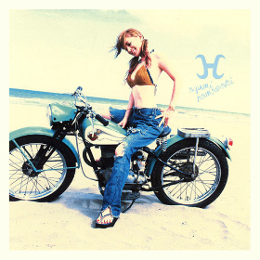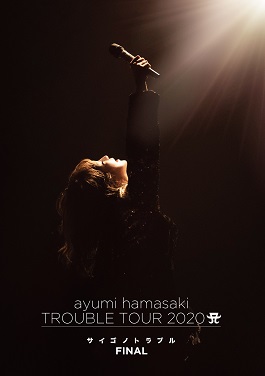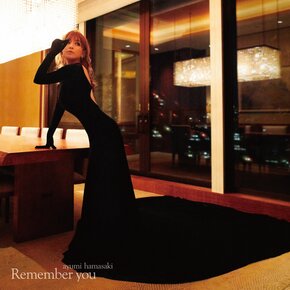
Ayumi Hamasaki is a Japanese singer, songwriter, record producer, actress, model, spokesperson, and entrepreneur. By 2002, Hamasaki had earned the nickname "Empress of J-pop" due to her popularity in Japan and throughout Asia, as well as being referred to as "the voice of the lost generation". Due to her success and relevance throughout her career, she is considered one of the top solo female artists of the Heisei era for her influence on the music industry and various fashion trends.

"Seasons" is a song by Japanese recording artist Ayumi Hamasaki for her third studio album, Duty (2000). It was written by Hamasaki, while production was handled by Max Matsuura. It premiered on June 7, 2000, as the third single from the album. The song is the final part of a trilogy from Duty; the other two singles being "Vogue" and "Far Away".

H is an EP by Japanese recording artist Ayumi Hamasaki, featuring songs later included on her fifth studio album Rainbow (2002). The EP contains the songs "Independent", "July 1st" and "Hanabi", all written and co-composed by Hamasaki, alongside composer Dai Nagao and producer Max Matsuura. Hamasaki had written and recorded the three songs when she was still hurt and influenced by the events of the September 11 attacks and the completion of her fourth studio album I Am... (2002).

Guilty is the ninth studio album by Japanese recording artist Ayumi Hamasaki. It was released on January 1, 2008 by Avex Trax. Guilty marks Hamasaki's ninth consecutive album to be fully produced by Japanese producer and manager Max Matsuura, while she contributes to the album as the lead vocalist, background vocalist, and songwriter to all songs. Recorded in Japanese with minor phrases in English, Guilty is a rock album with numerous musical elements such as pop rock, heavy metal, synthrock, and power ballad melodies.

"Mirrorcle World" is the forty-third physical single and forty-fourth single overall by Japanese singer Ayumi Hamasaki. The title track is an extended version of the song "Mirror," a two-minute introductory track on Hamasaki's ninth studio album, Guilty. The single was released on April 8, 2008, exactly ten years after her debut single, "Poker Face"; the single features two new recordings of her second and fifth singles, both released in 1998, "You" and "Depend on You," respectively.

A Complete: All Singles is a greatest hits album by Japanese singer Ayumi Hamasaki, released on September 10, 2008, to commemorate her tenth anniversary with Avex Trax. It compiles all of Hamasaki's singles from 1998 to 2008, with one new track.

"Rule"/"Sparkle" is a double A-side single by Japanese recording artist Ayumi Hamasaki from her tenth studio album, NEXT LEVEL' (2009). The song was released on a CD and DVD format on February 25, 2009 as the second single from the album. With "Rule" composed by Miki Wantanabe and "Sparkle" composed by Kazuhiro Hara, both songs were written by Hamasaki and produced by long-time collaborator Max Matsuura. "Rule" was used as the international theme song for the 2009 film Dragonball Evolution.

Next Level is the tenth studio album by Japanese recording artist Ayumi Hamasaki. It was released through Avex Trax on March 25, 2009 in five physical formats, and for digital consumption. The album was solely produced by Avex Trax owner Max Matsuura, whereas the album's content was written by Hamasaki herself. Additionally, it marks a return for several composers that helped construct her previous records, including Dai Nagao, CMJK, Kazuhiro Hara, HΛL, amongst others. Stylistically, Next Level is a departure from her previous albums, focusing on electronic music with elements of rock and dance.

"Sunrise/Sunset " is Japanese singer Ayumi Hamasaki's forty-sixth single, released on August 12, 2009. The song "Sunrise: Love is All" is used as the theme song to the 2009 Japanese drama show, Dandy Daddy? In addition, the song "Sunset: Love is All" was used in advertisements for the Panasonic Lumix FX-60 digital camera. The single debuted at #1 on Oricon weekly charts and became her 44th Top 10 single, making her the first artist to have 44 Top 10 singles in Oricon history. The single became Hamasaki's 21st consecutive single to debut at number-one position since her 2002 single "Free & Easy" on the Oricon weekly charts, making her the first solo artist and the first female artist to have 21 consecutive singles to debut at number-one position. It is also her 33rd number-one single on the Oricon weekly charts.

Rock 'n' Roll Circus is the eleventh studio album by Japanese recording artist Ayumi Hamasaki. It was released on April 14, 2010, by Avex Trax. It was also released just a little over a year after her 2009 album, Next Level. Rock 'n' Roll Circus marks Hamasaki's eleventh consecutive album to be fully produced by Japanese producer and manager Max Matsuura, while she contributes to the album as the lead vocalist, background vocalist, and songwriter to all songs. Recorded in Japanese with minor phrases in English, Rock 'n' Roll Circus is a rock album with numerous musical elements such as electropop, J-pop, rock, pop ballad, and dance music.

L is the 50th single by Japanese singer-songwriter Ayumi Hamasaki, released on 29 September 2010. It is Hamasaki's last release from the three-part project to celebrate fifty singles. Its title, L, is the Roman numeral for fifty. All of the songs from the single EP were recorded in Los Angeles.

"Dream On" is a song recorded by Japanese singer Naoya Urata of the band AAA. It features vocals from the singer-songwriter Ayumi Hamasaki. The song was released as a single on December 22, 2010. The song is Hamasaki's first collaboration since 2001's "A Song is Born". Moreover, this is Hamasaki's 26th consecutive song to reach the summit and 39th number-one single overall.

Again is the fourth extended play by Japanese recording artist Ayumi Hamasaki from her fourteenth studio album Love Again (2013). The EP contains the songs "Wake Me Up", "Sweet Scar", "Snowy Kiss" and "Ivy", alongside remixes and instrumental versions of the original tracks. Produced by longtime collaborator Max Matsuura, Again is a pop EP.
"Next Level" is a song recorded by Japanese recording artist and songwriter Ayumi Hamasaki taken from her tenth studio album Next Level (2009). The song was written by Hamasaki herself while the composition was by Dai Nagao and arrangement by HΛL. The song was conceived while Hamasaki was working on the studio album during her anniversary year, which was in April 2008. This year was to commemorate her ten-year anniversary since her debut single "Poker Face". "Next Level" was released as the album's lead and only promotional single on the same date as the album release digitally.

A One is the sixteenth full-length studio album recorded by Japanese singer Ayumi Hamasaki. It was released on April 8, 2015 by Avex Trax. It reached #4 on the Oricon charts.

Trouble is the seventh extended play by Japanese singer Ayumi Hamasaki. It was released digitally in Japan on August 6, 2018, and was eventually released physically on August 15. The EP features five original tracks, with all the tracks written by Hamasaki herself.

"Ohia no Ki" is a song by Japanese singer-songwriter Ayumi Hamasaki. It was released as a digital single only on July 5, 2020, following the airing of the final episode of M Aisubeki Hito ga Ite. The song is Hamasaki's first new release in almost two years and her first digital single since 2016's "We Are the Queens".

Ayumi Hamasaki Trouble Tour 2020 A: Saigo no Trouble – Final is Japanese pop singer Ayumi Hamasaki's 45th video release. It was released on January 27, 2021.

"23rd Monster" is a song by Japanese singer-songwriter Ayumi Hamasaki. It was released as a digital single only on April 8, 2021, marking the singer's 23rd anniversary since her debut with the single Poker Face in 1998.

Remember You is the eighteenth studio album by Japanese recording artist Ayumi Hamasaki. Preceded by seven singles released from 2020 to 2022, it also marks her first studio album release in the Reiwa era.



















